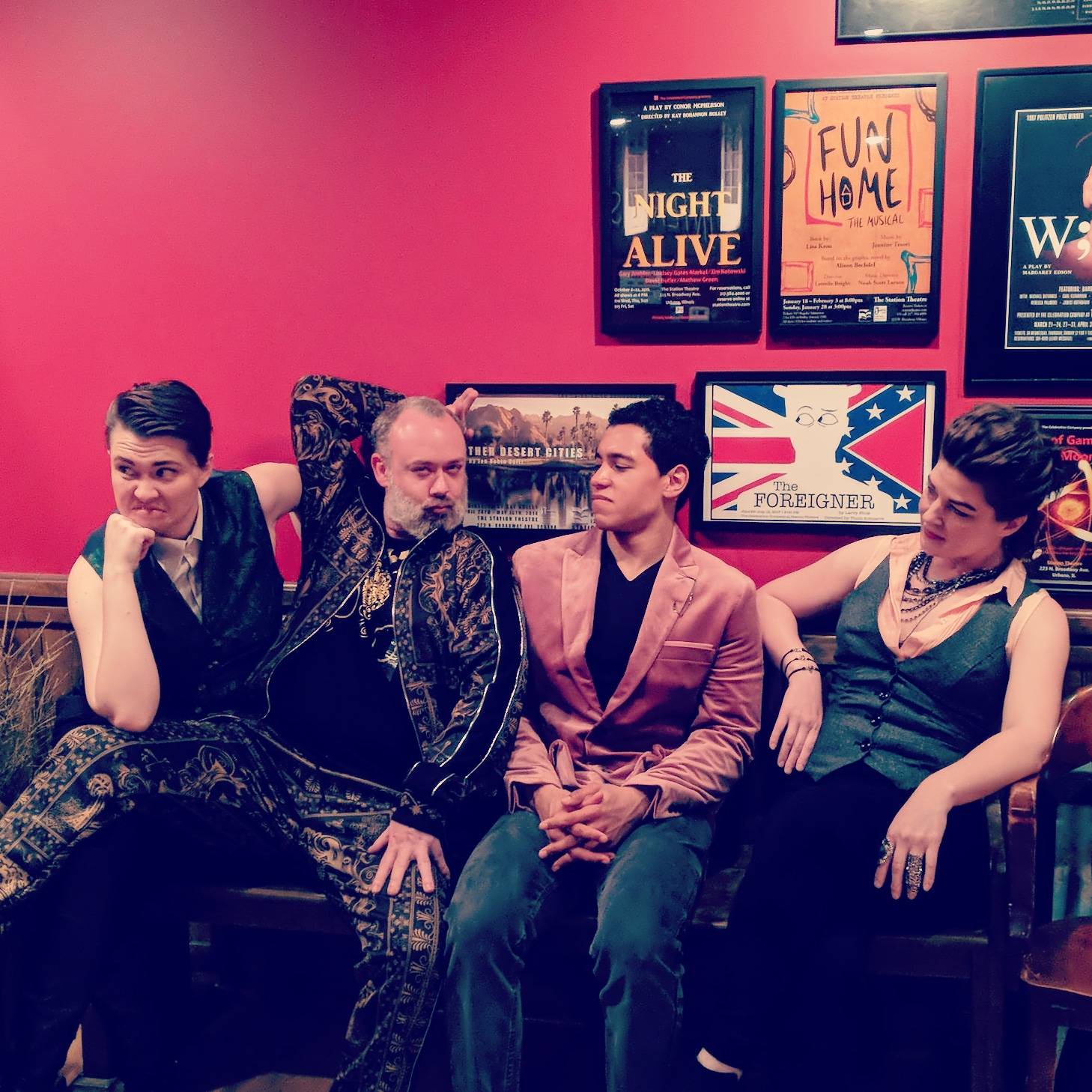It’s been nearly seven years since the Celebration Company at the Station Theatre presented a work by Shakespeare. The Bard’s arrival to the theatre has been long-awaited. Laura Alcantara has re-awakened Shakespeare at the Station with her directing debut, The Taming of the Shrew. Alcantara is a highly seasoned C-U performer. You might have recently seen her at the Station as the Angel in Marisol, as Annie Cannon in Silent Sky, or Goody Proctor in Parkland Theatre’s The Crucible among others. On top of that, she dances with Carnival Debauche and is active with Defy Gravity – Pole Fitness and Aerial Arts.
I chatted with Alcantara alongside two members of her equally stacked cast; Mindy Smith who portrays ‘shrew’ Katharina and Mathew Green who stars opposite as Petruchio. On a Friday night on the freshly painted set in the Station Theatre, we discussed Shakespeare on the whole, their work with one another, musician Prince’s influence on the production’s aesthetic, and the common misconceptions surrounding ‘Taming.’
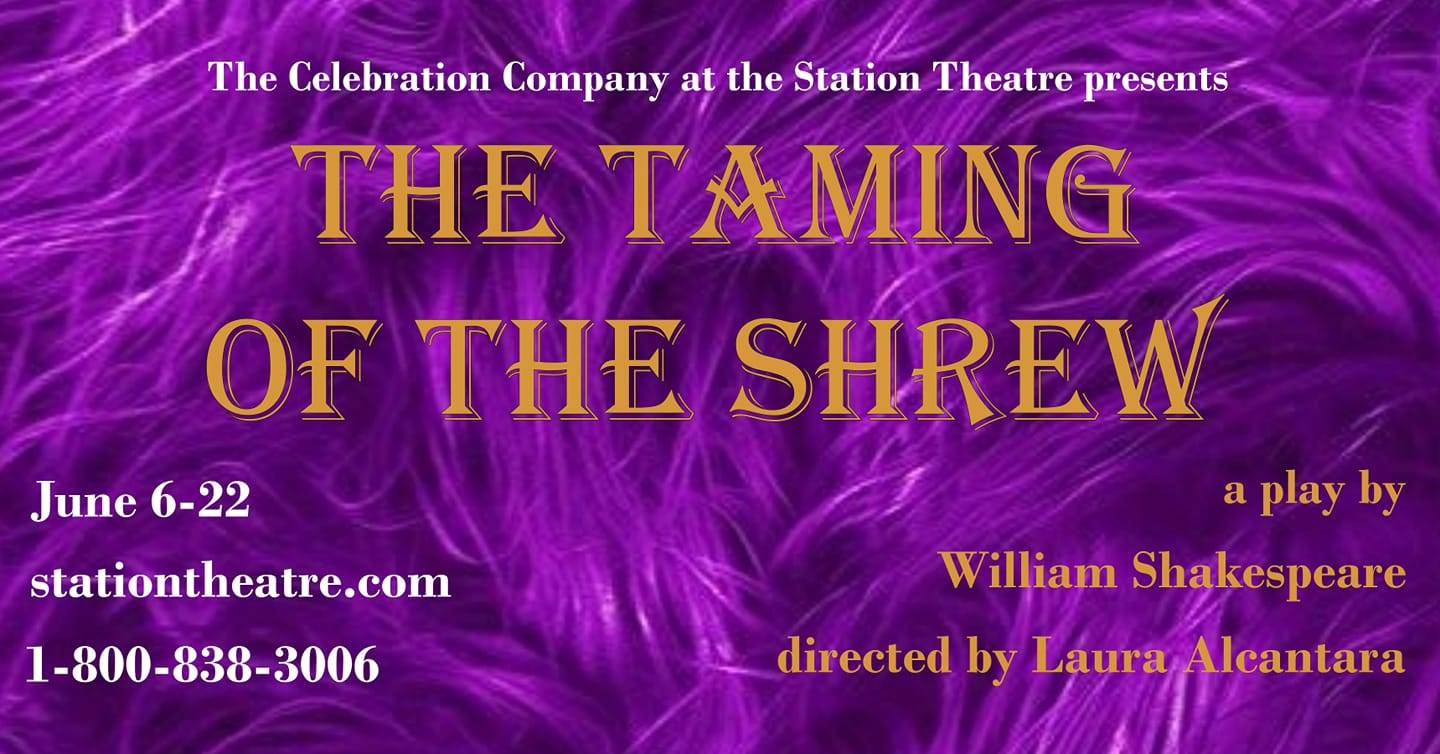
Smile Politely: This is your first time directing, so I wanted you to tell me a little bit about that and what made you select this play?
Laura Alcantara: Well, it’s been an experience. Like you said, this is my first time helming a show of any sort, really. I was lucky enough to assistant direct with Mathew (Green) for The Women of Lockerbie, and that was a great experience and it gave me the boost I needed to try and give it a go. As far as Taming itself, I love Bill Shakespeare so much. I spent most of my college career performing various works. Taming is just a lot of fun, honestly. If we’re gonna do summer Shakespeare, it might as well be something fun.
SP: My next question was to discuss your relationships with Shakespeare. You touched on that a little bit, but if you wanted to add onto that and if Mathew and Mindy wanted to comment on that as well?
Alcantara: I’ve got the prologue to Henry V tattooed on my body. I love that you have this beautiful, spectacular, poetic language, and yet if you dig deep you find things that are fun and naughty and dirty. People hold it up as this [jokingly pompous] epitome of theatre, of high art. It’s a lot of d*ck jokes. It’s a lot of raunchy humor and it was meant for the people in the cheap seats on the floor of the Globe Theatre. The Lords and Ladies saw it and I’m sure they enjoyed it but it is in fact theatre of the people.
Mindy Smith: I was fortunate to have a father who would read me Shakespeare out loud — well, Shakespeare and Sherlock — both need to be experienced out loud instead of trying to navigate that for yourself alone in your head. He’s theatrical as well to some extent. I got to experience the way it should be done. To hear the dance to the language and the rhythm that comes with it. So I had an early appreciation. I was not as fortunate as Laura. At my college we only got to do Shakespeare every other year. I happened to be a freshman the first year and didn’t get to dig into it, so I’m really excited to be a part of this project.
SP: Is this one of your first Shakespeares?
Smith: It’ll be the second because I did Much Ado About Nothing at Parkland. But [Kate] is certainly is a much meatier part.
SP: And Mathew, you were in Much Ado About Nothing as well? And I know that your relationship with Shakespeare goes beyond that.
Mathew Green: I’ve directed Shakespeare previously, I’ve performed in Shakespeare. What I like most about performing Shakespeare is that it helps bridge the gap between what people assume about the plays and what they can find out about them. It’s assumed that because they’re very old and poetic that they’re going to be boring or hard to understand. But when you see them performed, they’re very relatable and the stories are, for the most part, universal. Shakespeare is also very malleable. Laura mentioned that Shakespeare is of the people. Shakespeare is also of all times. Shakespeare done well can be about any time. I don’t know why we would consider it appropo to be doing a play about a patriarchal society and how they treat a woman who finds her voice and uses it. Or plays about tyrants or—can’t imagine why that’d be timely—
Alcantara: [sarcastically] Whaaaaaat?
Green: But that’s the beauty about Shakespeare. It is for all time.
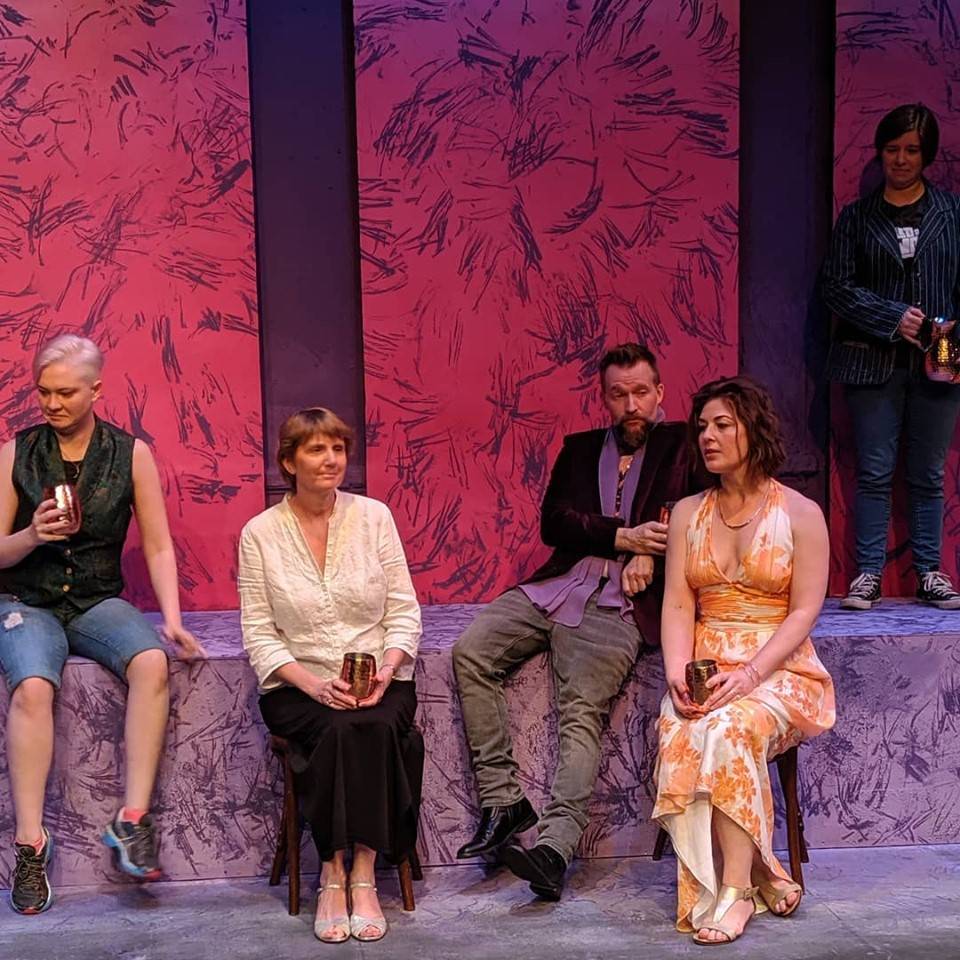
SP: You all have this wonderful relationship with Shakespeare, but I know in the past that you have all had relationships working with one another before. Do you want to talk about in what capacities you’ve worked together?
Alcantara: Aw, every time I think about it makes me smile on the inside. Mathew and [Taming stage manager] Yen Vi [Green] both actually dragged me out of a theatre slump, I guess you could say. I hadn’t done anything in a long time and I was cranky about it, didn’t know what to do, and Yen Vi messaged me about auditioning for [Parkland’s] The Crucible. Eventually she convinced me to come in and read for Mathew and Mathew decided I needed to step up and be Elizabeth [Proctor]. And I guess the rest is history because now I don’t leave him alone. [Laughing.]
Smith: I think that’s the first time we all worked together. I also worked with Mathew and Yen Vi in some form of a relationship for the next year straight.
SP: That’s right. You were in [the Station’s] Sweat—
Smith: And then [Mathew] came into ‘Ado’ and Yen Vi was stage managing that one. And then there was [2018 Pens to Lens film]Tomatoes where we were married but I was just dead most of the time. [Laughing]. Yeah, and then it was Sweat and then [Parkland’s] ‘Musical Comedy Murders’ and ‘Lockerbie.’ And then I took a break and he didn’t. I think the only thing that was in the middle of things before I took a break was August: Osage County.
Alcantara: I worked stage crew for that.
Green: I think when you do theatre, if you’re lucky, you fall in with a handful of people that you work with well with and with whom you’ve have a shared sensibility. Theatre is always a revolving door. People come, people go, people take time off, some people work constantly. But you do find patterns of people of “oh, they’re really good on stage together,” or it’s always exciting when I see those two people in a play together. I think of like Gary Ambler and Joi Hoffsommer. I’ve seen them paired together onstage many times and they’re always good and always interesting. Certain directors have—I won’t say favorites—but they’ll have actors that they know their capabilities.
Alcantara: There’s a level of trust there.
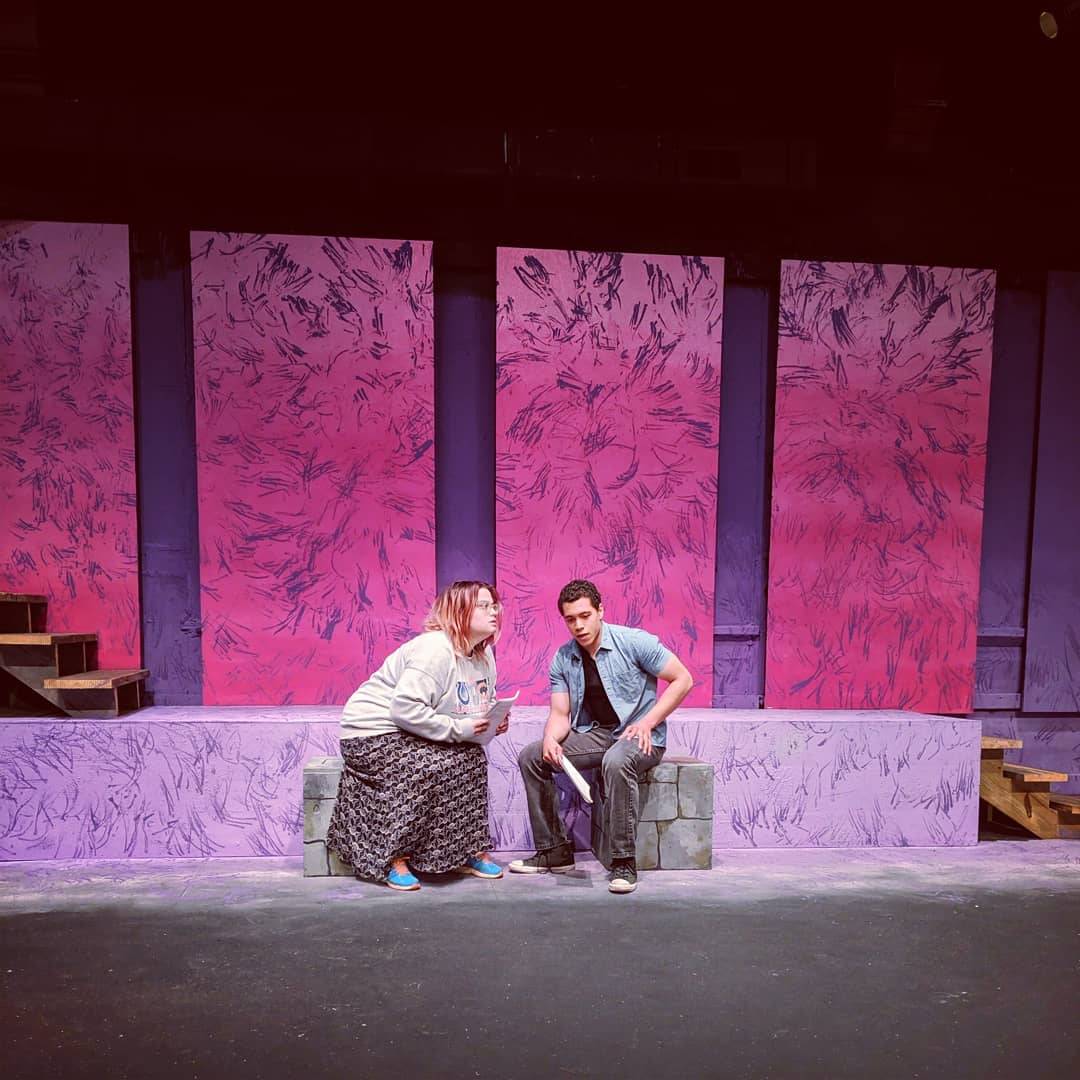
SP: This is more about this show in particular rather than your times in theatre as whole, but I’ve noticed that your marketing have been visual references to Prince, so I was wondering how that resonates within the show?
Alcantara: It was a bug that Mathew dropped into my ear while we were batting around the idea of this show. The thing that’s always struck me about Prince is he’s masculine, he’s a man’s man, but he’s very much in the feminine. He wears heels, he wears ruffled collars, he wears makeup. But you never see him in drag. It’s that fine fine line. I think that lends itself very well to what we have with this show.
Green: It’s an aesthetic inspiration.
Alcantara: Yeah.
SP: It’s been awhile since the Station has done Shakespeare. I know there’s a new wave of interest in directing, do you guys think the Station will start to do more Shakespeare and go more in that direction again?
Alcantara: I sure hope so. I’m gonna keep presenting crap for them until they tell me to knock it off. [Laughing.]
Green: I think there’s always interest in Shakespeare. I think it depends a lot on it it’s been done elsewhere in town. Because there are so many plays, there are so many playwrights, that you never necessarily want Shakespeare to saturate. I think that if you’re season like planning, or whatever — this is very like boring inside baseball kind of stuff — I think there is always interest because the plays are so good and because of all the things we’ve already said about it. I would hope that there will always be a place for Shakespeare here. The last time Shakespeare was done here was when I directed Hamlet.
SP: How long ago was that?
Green: [Collective group remembrance]. Hamlet was October of 2012.
Alcantara: It’s been a minute.
Green: Thinking about that, last year there was Shakespeare at Parkland. Theatre is cyclical. Right now there’s a wave of Chekhov or Chekhov-inspired pieces. It all comes back around.
SP: Three words that describe this production?
Alcantara: Foolish, colorful, fun.
Smith: Well, it is an experience — it’s not just a show, it’s an experience — it’s unexpected, I think, and funny. It’s so funny.
Green: Kate kicks ass.
Alcantara: [Laughing] Agreed.
SP: I was wondering if you had any additional thoughts or things you wanted to say about the show; things that perhaps the audience should know coming into the show?
Smith: Kate has a bad reputation that is not deserved. Such is this play in general. People who think they know this show need to come and see our version. They will be surprised and undone and laugh so hard they might pee a little.
Alcantara: I’ve laughed to the point of having to sit down on the ground at least twice in the past week.
Green: Laura had a very specific mandate in adapting the show for what we were trying to accomplish with it. Because of the cloud that hangs over it, as far as the titular shrew —
Smith: And Petruchio’s character as well—
Green: But I won’t let Petruchio off the hook. I don’t let any of the men of this play off the hook.
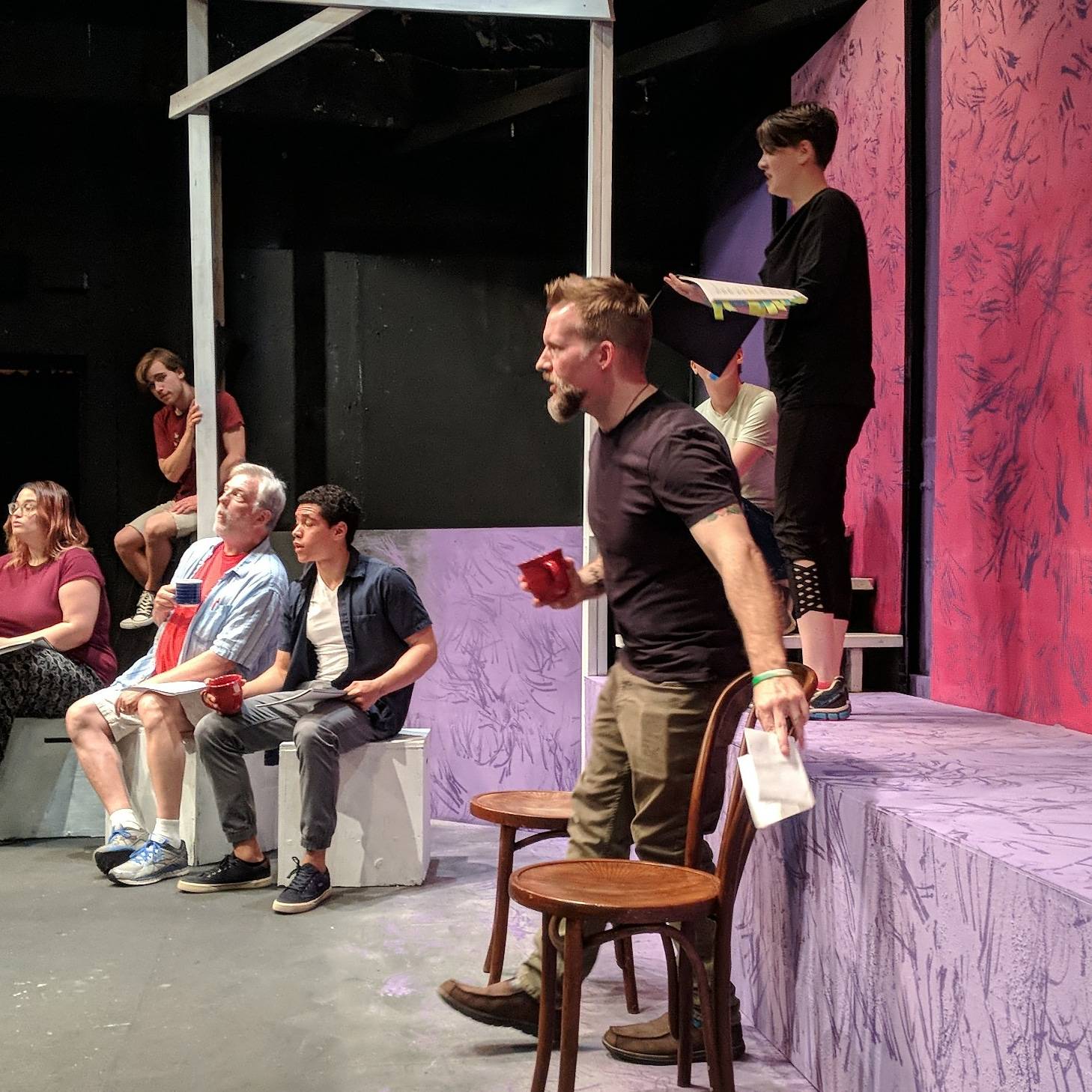
Smith: It’s not about being on the hook, it’s more, people take Shakespeare at surface level and they get it wrong. Ninety percent of the best stuff is subtext and as actors, if you don’t get that, and you don’t have a director who also knows how to guide you in that way, you miss it, and the play is icky. We are fortunate to have a director who gets it hardcore. We have a group of people who don’t want to tell a boring story and have flat characters of people. The dynamics are important.
Alcantara: To add on what Mindy and Mathew have both said, it’s about making sure the characters that we have on this stage are fully fleshed out people. I don’t think I’ve seen a pair of actors turn Kate and Petruchio into full human beings. They’ve always just been the characters. The shrill, biting, spoiled shrew, and the swaggering cock of the walk. They have those aspects, but at the same time there are real, wonderful moments between these two characters. I just want people to come and fall in love with it the same way that I have watching everyone build these relationships.
SP: I’m really glad you guys addressed the whole idea of The Taming of the Shrew being looked at wrongly because of the sexism.
Smith: I’m pretty sure when Shakespeare wrote it he put air quotes around [using air quotes] “Taming” and “Shrew.”
SP: I know that’s what people have said in the past so I think it’s important to stress that most of the story is what you read between and what you see in-between the lines and not necessarily what’s on paper.
Alcantara: All we’ve got through most of Shakespeare—all of Shakespeare really —are stage directions. Emphasis on intent and desires and stakes, that’s all built by the actors. We could make this a very different show. You can do that with any of his works. And I’m glad we’ve been able to take what people expect and flip it upside down.
—
The Taming of the Shrew
The Celebration Company at the Station Theatre
223 N Broadway Ave, Urbana
June 6th through 22nd
All shows at 7:30 p.m. with the exception of a matinee June 22nd at 3 p.m.
There will be no performance on June 16
Tickets: $15 regular, $10 students & senior
Order tickets online here
All photos courtesy of Laura Alcantara








